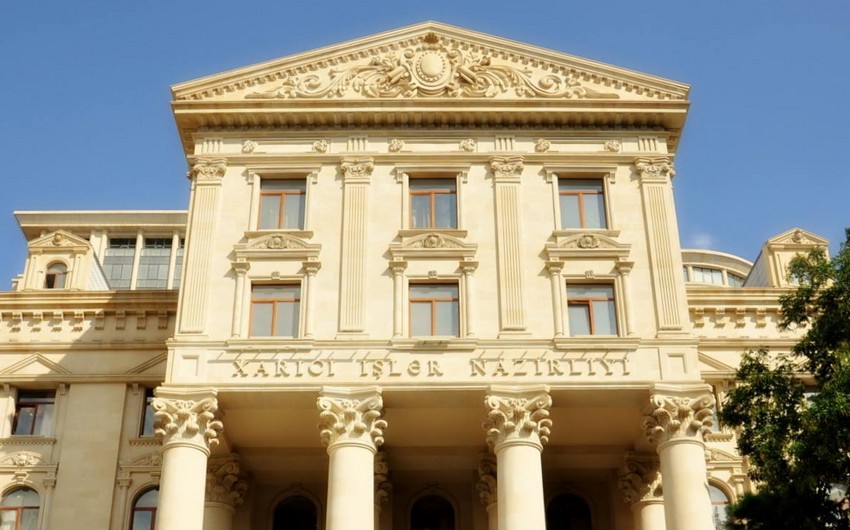The Ministry of Foreign Affairs of the Republic of Azerbaijan has issued a statement on the occasion of the Genocide Day of Azerbaijanis on March 31.
According to Report, the statement reads:
March 31 is the Day of Genocide of Azerbaijanis, commemorating the victims of the bloody massacre perpetrated by Armenians against Azerbaijanis in March 1918.
One hundred and three years ago in March-April 1918, massacres were committed in the city of Baku and other towns and districts of the Baku Province by the Armenian dashnak - bolshevik armed groups operating under the mandate of the Baku Council (Baku Soviet), and tens of thousands of civilians were killed only for their ethnic and religious affiliation. We must continue to honor the victims and ensure that these events' memory prevents their recurrence.
Ethnic Armenian Stepan Shaumian, the Commissar Extraordinary for the Caucasus, admitted that 6,000 armed soldiers of the Baku Soviet and 4,000 from the Dashnaksutyun party participated in the massacres against the Azerbaijani people.[1]
The genocide carried out against the Azerbaijanis and Baku also covered Shamakhi, Guba, Iravan, Zangazur, Garabagh, Nakhchivan, and Kars regions. During the first five months of 1918, more than 16,000 people were murdered with utmost cruelty in Guba province alone; 167 villages were destroyed. Mass graves discovered in the Guba region in 2007 constitute clear evidence of the inhumane acts committed by Armenians.
March massacres of 1918 were well prepared and ruthlessly implemented act by radical nationalist Armenians against Azerbaijanis on racial discrimination and ethnic cleansing.
The Government of the Azerbaijan Democratic Republic established in 1918 the Extraordinary Investigation Commission to investigate the serious crimes perpetrated by Armenians and have taken several measures to preserve the facts revealed by the Commission memory of the people and to inform the world community about these atrocities. The Extraordinary Investigation Commission, which was comprised of the best lawyers of that time representing different nationalities – Russians, Jewish, Polish, Georgians, and even Armenians, based on the evidence launched criminal cases against 194 individuals accused of different crimes against the peaceful population; 24 individuals in Baku and about 100 individuals in Shamakhy had been arrested for perpetrated crimes.
However, this process had been suspended after the demise of the Azerbaijan Democratic Republic, a full investigation of the tragic events and its political-legal assessment had been prevented. Only after 80 years – on March 26, 1998, the adequate political assessment was given to these horrific events by the Decree of the President of the Republic of Azerbaijan "On the Genocide of Azerbaijanis," signed by National Leader Heydar Aliyev and March 31 was declared the Day of Genocide of Azerbaijanis.
The commemoration of the Day of Genocide of Azerbaijanis raises the world community's awareness of the massacre and ethnic cleansing of Azerbaijanis in the past and present.
Even after more than a century has passed, Armenia has continued its policy of committing crimes against Azerbaijanis on ethnic grounds, keeping Nagorno-Karabakh and the surrounding seven regions under occupation for nearly three decades.
During the nearly thirty years of occupation, Armenia carried through a policy of ethnic cleansing of hundreds of thousands of Azerbaijanis in Armenia and Azerbaijan's seized lands. Armenia also committed numerous war crimes, crimes against humanity, and acts of genocide, including the Khojaly Genocide of February 1992. Armenian forces deliberately targeted through rocket and missile strikes the peaceful population of Ganja, Barda, Tartar, and other Azerbaijan cities during military operations launched in response to the next army provocation against Azerbaijan on September 27, 2020.
In doing so, Armenia has brought back the memories of a century ago March Massacre.
While remembering the innocent victims of the March tragedy, we strongly condemn the deliberate policy of genocide, crimes against humanity, racial discrimination, and ethnic cleansing by Armenia committed against the people of Azerbaijan until now and reiterated the importance of ceasing impunity of Armenia to prevent the occurrence of such inhumane crimes. We call on Armenia to uphold its international legal obligations. Azerbaijan, from its side, will take all available and necessary legal measures to ensure peace and maintain accountability.


 https://static.report.az/photo/304aff36-c4b1-34b8-bb37-b0d46fc7392a.jpg
https://static.report.az/photo/304aff36-c4b1-34b8-bb37-b0d46fc7392a.jpg

